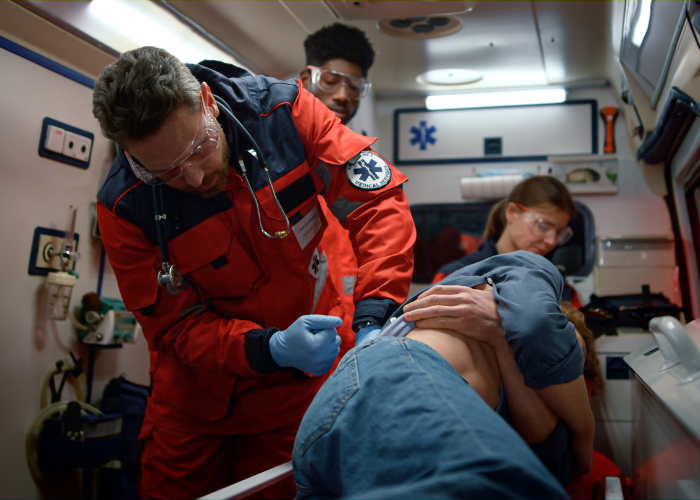IMANA NEWS
Why You Should Learn Basic First Aid for Medical Emergencies
21 August 2024

First aid saves lives but many Americans are ill-prepared or aren’t up to date on critical life-saving skills.
As a provider of healthcare services, the Islamic Medical Association of North America (IMANA) offers insights into the impact of basic first aid during medical emergencies. Learn how it makes a difference in life-and-death situations.
Why First Aid Matters
Injuries like sprains and strains, bruises from tripping or falling, a fine paper cut that slices through the skin—these issues are common and treatable.
But your first aid knowledge must go beyond these accidents. You must also know what to do if you get a fracture or if your child suddenly starts choking on food. Developing knowledge of basic first aid for medical emergencies can increase your chances of survival.
First aid typically involves knowing what to do when emergency situations such as these arise:
- Strokes
- Choking
- Seizures
- Asthma emergencies
- Burns
- Anaphylaxis
- Diabetic emergencies
- Severe trauma and external bleeding
- Heart attacks
- Spinal, head, and neck injuries
- Poisoning
By learning how to deliver emergency medical care, you can:
Prevent the Escalation of Injuries
Up to 59% of injury-related deaths can be prevented with the timely delivery of first aid. It can also prevent infections.
Acting quickly and calmly reduces the likelihood that a medical issue will become worse. For example, reducing blood loss from serious cuts and injuries can stop the body from going into shock which is life-threatening and can result in death.
Provide Pain Relief
Pain from injuries can be particularly intense. The patient may also experience severe stress and anxiety while waiting for medical assistance.
Easy access to over-the-counter medications like antacids, anti-inflammatories, and analgesics can make a drastic difference. These basic medications can provide pain relief, bring down fever, and facilitate the healing of minor injuries. Certain drugs can also reduce agitation and disorientation.
Promote Recovery
People who receive early and effective first aid are 1.28 times more likely to show improvement. Aside from speeding up recovery from sprains, ruptures, bruises, abrasions, and other relatively mild injuries, ongoing care, comfort, and pain relief could also reduce mortality by 1.8% to 4.5%.
Reduce Hospital Time
Time is of the essence in many medical emergencies. By preventing the situation from deteriorating with appropriate care, affected individuals may be able to avoid initial visits to the hospital. In cases where escalation of care is needed, the length of stay and readmission rates can be reduced.
Save Lives
According to a charity, 140,000 people die every year in situations that could have been prevented with timely first aid. Becoming a qualified first aider can thus make all the difference between a life lost and a life saved.
For example, if a person stops breathing, performing cardiopulmonary resuscitation (CPR) could restart circulation and respiration, keeping the organs alive.
Since cardiac arrest leads to death in 9 out of 10 people, immediate first aid can greatly improve their chances of survival.
How Medical Interventions Are Helping Syrian Refugees
According to the United Nations High Commissioner for Refugees (UNHCR), 5.5 million Syrians have been forced to leave their homes in search of safety. Most live in UN-sponsored camps in Egypt, Iraq, Jordan, Lebanon, and Türkiye, but have limited access to healthcare services, particularly first aid.
IMANA is committed to improving their circumstances. Volunteer healthcare professionals deliver urgently needed care to International Medical Relief (IMR) missions. Through the ServeSyria initiative, we have provided free basic first aid to refugees in Jordan.
IMANA also offers health education, including first aid knowledge. This allows learners to respond with appropriate first-aid procedures that can save lives and reduce the impact of accidents, health issues, and injuries,
Knowledge of first aid also builds confidence, allowing individuals to deal with the injury promptly while alleviating distress and ensuring a speedy recovery.
How IMANA Delivers First Aid Through Serve Syria’s
IMANA’s medical teams travel to Syria quarterly to serve Syrian refugees in Amman, Jordan. Our teams, who have so far delivered medical care to 38,040 patients, provide medicines and primary care for free.
Our first aid measures focus on the following areas:
Cataract Surgeries
There is a high prevalence of vision impairment among Syrian refugees. IMANA’s Cataract Surgery program responds to this need. Our teams have operated on 1075 patients with the assistance of United Mission for Relief and Development (UMR).
If cataracts aren’t attended to promptly, they can cause vision loss and impairment. According to the World Health Organization, cataracts are among the world’s leading cause of blindness.
Mobile Clinics
IMANA also serves internally displaced Syrians (IDPs). We provided funding for mobile clinics after the 2023 earthquake in northern Syria. Since then, we’ve catered to 21,998 IDPs.
Prenatal Care and Physiotherapeutic Intervention in Autism
Barriers to reproductive and maternity healthcare can cause more negative pregnancy and neonatal outcomes for Syrian refugees in the Istanbul region. Without timely prenatal care, babies are more likely to suffer low birth weights and high mortality rates.
IMANA addresses the lack of healthcare accessibility with our ServeTurkiye program. Since 2022, we’ve catered to the well-being of 220 expectant mothers.
Additionally, our partnership with the Ensar Charity Association has allowed us to provide autistic children with physiotherapy counseling and treatment.
You Can Save Someone’s Life With First Aid
The ability to deliver first aid is a skill that IMANA encourages everyone to learn. It can empower you to save lives, reduce injuries, and facilitate better outcomes during medical emergencies.
Medical professionals with more advanced first-aid knowledge and significant medical experience are invited to join one of our many medical relief teams. We currently have open slots for deployment in Pakistan, Yemen and Jordan.
If you prefer to donate, your financial assistance will be highly appreciated. You can allocate your funds based on the countries we help and the causes we support.